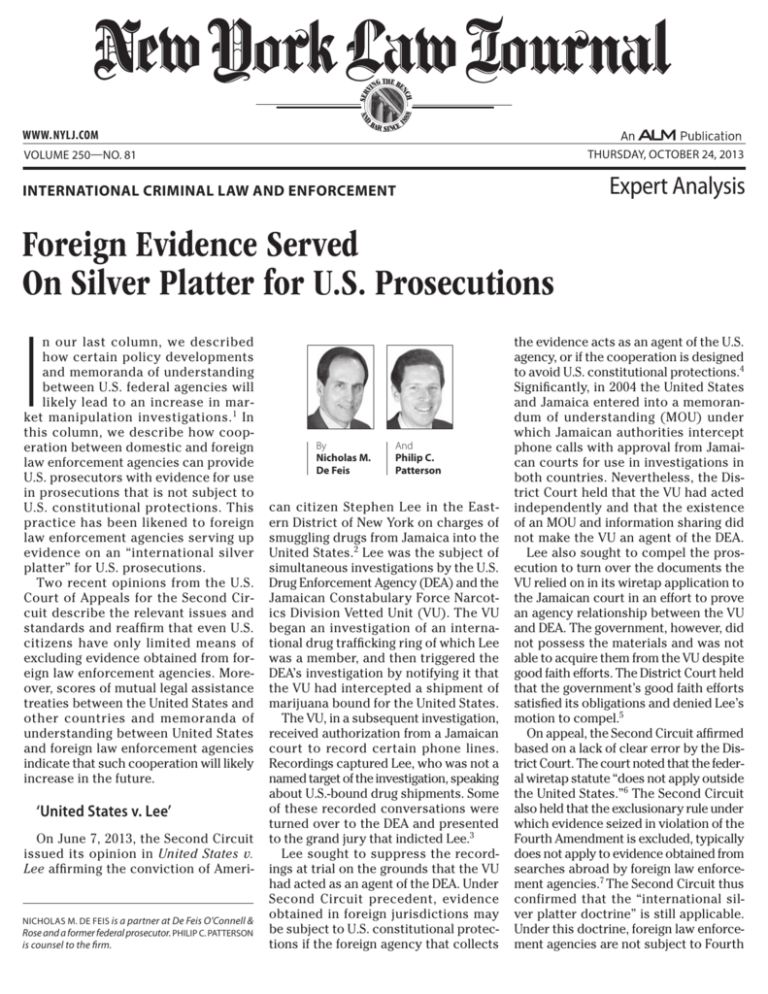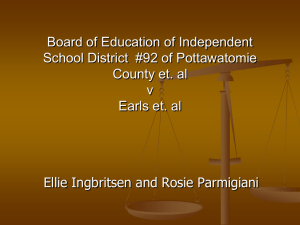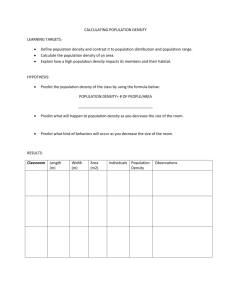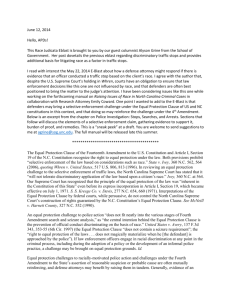
AND
88
8
SER
V
H
NC
THE BE
ING
www. NYLJ.com
1
BA
R SINCE
thursday, october 24, 2013
Volume 250—NO. 81
Expert Analysis
International Criminal Law and Enforcement
Foreign Evidence Served
On Silver Platter for U.S. Prosecutions
I
n our last column, we described
how certain policy developments
and memoranda of understanding
between U.S. federal agencies will
likely lead to an increase in market manipulation investigations. 1 In
this column, we describe how cooperation between domestic and foreign
law enforcement agencies can provide
U.S. prosecutors with evidence for use
in prosecutions that is not subject to
U.S. constitutional protections. This
practice has been likened to foreign
law enforcement agencies serving up
evidence on an “international silver
platter” for U.S. prosecutions.
Two recent opinions from the U.S.
Court of Appeals for the Second Circuit describe the relevant issues and
standards and reaffirm that even U.S.
citizens have only limited means of
excluding evidence obtained from foreign law enforcement agencies. Moreover, scores of mutual legal assistance
treaties between the United States and
other countries and memoranda of
understanding between United States
and foreign law enforcement agencies
indicate that such cooperation will likely
increase in the future.
‘United States v. Lee’
On June 7, 2013, the Second Circuit
issued its opinion in United States v.
Lee affirming the conviction of Ameri-
Nicholas M. De Feis is a partner at De Feis O’Connell &
Rose and a former federal prosecutor. Philip C. Patterson
is counsel to the firm.
By
Nicholas M.
De Feis
And
Philip C.
Patterson
can citizen Stephen Lee in the Eastern District of New York on charges of
smuggling drugs from Jamaica into the
United States.2 Lee was the subject of
simultaneous investigations by the U.S.
Drug Enforcement Agency (DEA) and the
Jamaican Constabulary Force Narcotics Division Vetted Unit (VU). The VU
began an investigation of an international drug trafficking ring of which Lee
was a member, and then triggered the
DEA’s investigation by notifying it that
the VU had intercepted a shipment of
marijuana bound for the United States.
The VU, in a subsequent investigation,
received authorization from a Jamaican
court to record certain phone lines.
Recordings captured Lee, who was not a
named target of the investigation, speaking
about U.S.-bound drug shipments. Some
of these recorded conversations were
turned over to the DEA and presented
to the grand jury that indicted Lee.3
Lee sought to suppress the recordings at trial on the grounds that the VU
had acted as an agent of the DEA. Under
Second Circuit precedent, evidence
obtained in foreign jurisdictions may
be subject to U.S. constitutional protections if the foreign agency that collects
the evidence acts as an agent of the U.S.
agency, or if the cooperation is designed
to avoid U.S. constitutional protections.4
Significantly, in 2004 the United States
and Jamaica entered into a memorandum of understanding (MOU) under
which Jamaican authorities intercept
phone calls with approval from Jamaican courts for use in investigations in
both countries. Nevertheless, the District Court held that the VU had acted
independently and that the existence
of an MOU and information sharing did
not make the VU an agent of the DEA.
Lee also sought to compel the prosecution to turn over the documents the
VU relied on in its wiretap application to
the Jamaican court in an effort to prove
an agency relationship between the VU
and DEA. The government, however, did
not possess the materials and was not
able to acquire them from the VU despite
good faith efforts. The District Court held
that the government’s good faith efforts
satisfied its obligations and denied Lee’s
motion to compel.5
On appeal, the Second Circuit affirmed
based on a lack of clear error by the District Court. The court noted that the federal wiretap statute “does not apply outside
the United States.”6 The Second Circuit
also held that the exclusionary rule under
which evidence seized in violation of the
Fourth Amendment is excluded, typically
does not apply to evidence obtained from
searches abroad by foreign law enforcement agencies.7 The Second Circuit thus
confirmed that the “international silver platter doctrine” is still applicable.
Under this doctrine, foreign law enforcement agencies are not subject to Fourth
thursday, october 24, 2013
Amendment restrictions and can serve
up unconstitutionally-obtained evidence
to U.S. prosecutors on a “silver platter.”8
The circuit rejected the argument that
the “close, ongoing and formalized collaboration” between the VU and DEA made
the VU an agent of the DEA and thus subject to Fourth Amendment restrictions.
The court noted that the VU investigation
of the trafficking organization was commenced first and that the VU initiated the
wiretaps on its own accord and not in
consultation with the DEA.9
Somewhat worrisome was the Second
Circuit’s response to Lee’s argument that
the prosecution should be compelled to
turn over the documents underlying the
VU’s wiretap application to a Jamaican
court. The government represented that
it was not in possession of the documents
and that it requested but did not receive
them from the VU. The Second Circuit
held that Rule 16 of the Federal Rules of
Criminal Procedure does not require the
government to turn over materials that
are not in its “possession, custody, or control” and that the government made the
required good faith effort to obtain them.10
Lee countered that without the underlying
documents, he could not assess whether
they were properly obtained. The circuit
acknowledged that the Fourth Amendment exclusionary rule can bar overseas
evidence in two circumstances—where
the conduct of foreign officials was so
egregious that it would “shock the judicial
conscience,” or where the nature of the
cooperation between the United States
and foreign agencies implicated Fourth
Amendment restrictions.
The court, however, then held that “even
if [the VU] somehow operated improperly
under Jamaican law in obtaining the electronic surveillance of Lee—and the record
belies any such suggestion—nothing in
this record shows that they operated in
a manner that would implicate either of
the limited exceptions.”
The Second Circuit’s holding seems
to present a classic Catch-22. Case law
makes clear that egregious conduct by
foreign law enforcement agencies or
close coordination with domestic law
enforcement agencies subjects overseas evidence to Fourth Amendment
restrictions, but in Lee the court rejected such arguments without documents
sufficient to fully assess the conduct of
the foreign law enforcement agencies.
This presents a gaping hole in Fourth
Amendment restrictions regarding
evidence obtained overseas. Not only
can foreign law enforcement agencies
serve up evidence on a silver platter
for domestic prosecutions, but they
can also prevent any real exclusionary
challenge to the evidence by withholding materials underlying their actions.
No matter how improper the actions of
foreign agencies might be in obtaining
evidence overseas, defendants may be
unable to base a Fourth Amendment
challenge simply because the same
agencies withhold certain materials.
The troubling potential of this holding
becomes more apparent in another Second Circuit opinion involving overseas
evidence decided only months after Lee.
Two opinions from the
Second Circuit reaffirm
that even U.S. citizens
have only limited means
of excluding evidence
obtained from foreign law
enforcement agencies.
‘United States v. Getto’
On Sept. 9, 2013, the Second Circuit
issued its opinion in United States v. Getto.11 Matthew Getto—an American citizen—was convicted for mail and wire
fraud based on his role in a conspiracy
to defraud Americans through a lottery
telemarketing scheme. The scheme
operated out of boiler rooms located
in Israel. In 2008 the FBI began an investigation into the conspiracy based on a
tip, and ultimately made a request pursuant to the United States’ Mutual Legal
Assistance Treaty with Israel (MLAT)
for the Israeli National Police (INP) to
investigate the conspiracy.
The MLAT request included phone
numbers associated with the conspiracy,
which the INP used to locate a boiler room
in Israel. The INP then obtained authorization from an Israeli court to search
the boiler room and install a surveillance
device in it. Some of the evidence obtained
was used to support an arrest warrant for
Getto in the United States. In the United
States, Getto argued for suppression
based on the joint efforts of the FBI and
INP and egregious conduct by the INP. The
District Court denied the application, and
Getto was convicted.12
On appeal, the Second Circuit began
by noting that in Lee it had recently reaffirmed the “international silver platter
doctrine” and recognized the two circumstances—egregious conduct by foreign
law enforcement agencies in obtaining
evidence, or close cooperation between
U.S. and foreign law enforcement agencies—that might impose Fourth Amendment restrictions on evidence obtained
overseas. Getto argued that both circumstances were present.
As for egregious conduct, Getto argued
that the INP searched the boiler room
before it had court authorization. Getto
offered only suspicions to support this
contention, but the Second Circuit, accepting them for argument’s sake, held that
such conduct was merely illegal but not so
egregious that it could “shock the judicial
conscience.” The Second Circuit wrote,
“We have accordingly held that conduct
did not shock the judicial conscience
when, for example, there was no act of
torture, terror, or custodial interrogation of any kind, or when there was no
claim of rubbing pepper in the eyes.”13
The court added that this standard comes
not from the Fourth Amendment, but from
“a federal court’s authority to exercise its
supervisory powers over the administration of federal justice.”14
As for the Fourth Amendment argument,
the court reiterated that such restrictions
attach only where the foreign agency
acted as an agent of the U.S. agency or
the cooperation was designed to evade
constitutional protections. The court held
that an MLAT is not enough to render a
foreign law enforcement agency an agent
of a U.S. law enforcement agency. Instead,
“American officials must play some role
in controlling or directing the conduct of
the foreign parallel investigation.”
The court explained that the exclusionary rule under the Fourth Amendment
exists to “inculcate a respect for the
thursday, october 24, 2013
Constitution in the police of our own
nation.” The court held that there was
no evidence that the FBI had controlled
the INP’s actions. Moreover, there was
no evidence that the FBI made the MLAT
request with the intent to evade U.S.
constitutional protections.15 The Second
Circuit thus held that the District Court
did not err in declining to suppress the
evidence obtained overseas.
Troubling Implications
The Second Circuit’s opinions in Lee
and Getto make clear that the grounds
upon which to challenge evidence
obtained overseas by foreign law
enforcement agencies in U.S. prosecutions are limited and narrow. Moreover,
Lee and Getto reveal that defendants
can essentially be denied the means to
mount such challenges, and that even if
they are able to mount such challenges
federal courts will overlook conduct by
foreign agencies that would be plainly
illegal if done by a U.S. agency.
Moreover, the legal standards
described, reaffirmed and applied in both
Lee and Getto can seem almost glib. To
paraphrase, foreign law enforcement
agents can essentially serve up on a platter evidence for U.S. prosecutions (that
would otherwise be excluded if obtained
by a domestic agency) unless the foreign
agents obtained the evidence by rubbing
pepper in someone’s eyes. Given that in
many countries a government agent rubbing pepper in someone’s eyes is a real
possibility, these standards may warrant
more sober scrutiny by federal courts.
This is particularly so when the “shocks
the conscience” standard is—by the Second Circuit’s own description—apparently
a purely discretionary power vested in
federal courts.
For example, although the Fourth
Amendment and the Federal Rules of
Criminal Procedure may require only
that U.S. prosecutors make a “good
faith” effort to obtain foreign evidence
sought by a defendant, perhaps the
fact that the defendant cannot obtain
it and thus cannot even mount a Fourth
Amendment challenge warrants closer
scrutiny by a federal court. Indeed, if
another basis for an exclusionary challenge is an intent by the domestic and
foreign agencies to evade Fourth Amendment restrictions, the mere fact that the
foreign agency declines to provide information necessary to assess the agencies’
true intent might support an inference
that the intent was improper.
The court in ‘Getto’ held
that an MLAT is not enough
to render a foreign law
enforcement agency
an agent of a U.S. law
enforcement agency.
Instead, “American officials
must play some role in
controlling or directing
the conduct of the foreign
parallel investigation.”
If federal courts can exclude evidence
based on a subjective interpretation
of what constitutes “egregious” conduct, federal courts in certain circumstances can and should demand more
information about how foreign agencies obtained evidence they supply to
U.S. prosecutors and perhaps examine
in camera or even order disclosure of
communications between the involved
law enforcement agencies.
The issues involved in the use of foreign evidence in our courts require greater attention because cooperation among
domestic and foreign law enforcement
agencies will only increase in the future.
The United States currently has mutual
legal assistance treaties with 56 countries. Also in force are a number of EU
instruments and protocols that supplement or create mutual legal assistance
relationships between the United States
and every EU member. The United States
has signed and ratified UN conventions
relating to crime prevention, and the United States has a mutual legal assistance
agreement with China. The United States
also has “asset sharing agreements”—
such as the one with Jamaica referenced
in Lee—with seven countries. The U.S.
Treasury Department’s Financial Crimes
Enforcement Network (FinCEN) also has
memoranda of understanding or letter
understandings with the financial intelligence units from 47 countries.16
In short, U.S. prosecutors have scores
of avenues from which to obtain overseas evidence from foreign agencies.
The United States also continues to
negotiate with other countries for
additional mutual legal assistance treaties, memoranda of understanding, and
other methods of information sharing
for law enforcement purposes. Thus,
U.S. prosecutors will increasingly rely
on evidence obtained overseas by foreign law enforcement agencies. The
ease with which information obtained
overseas can circumvent the Fourth
Amendment in U.S. prosecutions warrants heightened scrutiny of the close
cooperation between foreign and
domestic law enforcement agencies.
Defense attorneys must be wary of evidence obtained overseas and creative in
devising effective means to challenge it.
••••••••••••••••
•••••••••••••
1. Nicholas M. De Feis and Philip C. Patterson, “Foreign
Price-Fixing Probes Spur U.S. Inquiries,” N.Y.L.J., July 31,
2013, available at http://www.newyorklawjournal.com/
PubArticleNY.jsp?id=1202613158051&Foreign_PriceFixing_
Probes_Spur_US_Inquiries&slreturn=20130825155305.
2. 723 F.3d 134 (2d Cir 2013).
3. Id. at 137-38.
4. United States v. Maturo, 982 F.2d 57, 60 (2d Cir. 1992).
5. Lee, 723 F.3d 137-38.
6. Id. at 139 (citing Maturo, 982 F.2d at 60; 18 U.S.C. §§25102520).
7. Id. at 139 (citing United States v. Janis, 428 U.S. 433, 455
n.31 (1976).
8. Id. at 139 n.3 (recounting history of the “international
silver platter doctrine).
9. Id. at 141.
10. Id. at 141.
11. No. 11 CR 1237, 2013 U.S. App. Lexis 18739 (2d Cir. Sept.
9, 2013).
12. 2013 U.S. App. Lexis 18739 at *6-9.
13. 2013 U.S. App. Lexis 18739, at *15-16 (internal quotations
and citations omitted).
14. Id. at *17.
15. Id. at *21-28.
16. A summary of these agreements is available at http://
www.state.gov/j/inl/rls/nrcrpt/2012/vol2/184110.htm.
Reprinted with permission from the October 24, 2013 edition of the NEW YORK LAW
JOURNAL © 2013 ALM Media Properties, LLC. All rights reserved. Further duplication
without permission is prohibited. For information, contact 877-257-3382 or reprints@alm.
com. # 070-10-13-27






